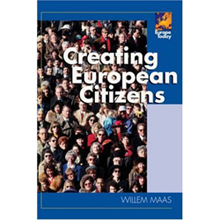 |
Skillfully guiding the reader through a complex history, the author illustrates how the EU has multiplied the sources of rights and political identity available to individuals, thereby challenging orthodox notions of citizenship based on a mutually exclusive set of relations between state and citizen.—Perspectives on Politics
[Creating European Citizens] has many strengths....For a start, it not only integrates free movement and citizenship, the book also [tackles…] the relationship between citizenship rights and human rights. Secondly, the book provides an interesting discussion of the impact on European citizenship of enlargement and the interaction between European citizenship and the nationality and citizenship policies of new members... And thirdly, the book provides convincing explanations of why there is also opposition among some political leaders, and their peoples, to European citizenship. Finally, the organization of the book is masterly. All these issues are woven together in a mere 120 pages of text in such a way that none of their complexity is lost while, at the same time, the book could easily be read by an interested member of the public as well as the student or scholar.—Elizabeth Meehan, EUSA Review
Rather than focusing narrowly on the economic ramifications of integration, the author explores the drive to create a wider community of people... Well written, with the argument set out in a chronological and straightforward fashion... This book will appeal to theorists and practitioners alike, as well as undergraduates and those with a more specialist interest in issues of integration, citizenship and nationalism.—Political Studies Review
Willem Maas’s study is a definitive political history of European citizenship rights and the free movement of persons, from the Treaties of Paris and Rome in the 1950s to the struggles over the EU constitution. It combines careful empirical documentation with incisive political theory, on a subject insufficiently studied by mainstream political science. While offering an upbeat account of the steady expansion and deepening of the remarkable legal construction of European citizenship, he wisely reminds us of its limitations and reversibility.—Adrian Favell, UCLA
Maas has written an excellent analysis and review of the evolution of European citizenship thus far. It is a welcome addition to EU literature and recommended for political scientists, historians, and scholars of the EU. The book is clearly written with extensive footnotes and references that are especially useful and valuable. There are meticulous details of negotiations and contentious debates among member states and EU institutions that bring a deeper understanding of EU workings behind closed doors... Highly recommended.—CHOICE
In this short but very detailed work, Willem Maas seeks to outline the history of citizenship as it applies to the European Union and its antecedent organizations. The focus is both on “the ‘high politics’ of intergovernmental conferences”—and their behind-the-scenes compromises—and “the ‘low politics’ of interpretation by the Court and implementation by the Commission.” Developments in both of these areas are clearly outlined and analyzed by Maas. ... What comes through in Maas’s work is the sense that European Union citizenship is a clear illustration of both the achievements and limitations of European integration.—Canadian Journal of Political Science
Willem Maas provides a concise political history of the institution of citizenship within the EU. Since citizenship rights had always been closely connected to processes of state formation, sovereignty and territoriality, his main question refers to the conditions supporting the emergence of citizenship beyond the state… Maas argues that the emergence of EU citizenship is best explained by the political will of the key players to establish free movement in the common market… Yet, his careful long-term analysis of successful and unsuccessful proposals also shows that the development of citizenship is always fragmented and volatile. This is a very compact monograph grasping the development of citizenship and the creation of European citizens over a long historical period and covering a broad number of events. [Its] main achievement lies in utilising the citizenship perspective to gain more fundamental insights into European integration beyond historical explanations of European citizenship itself. According to this study, the historical search for citizenship reflects the political quest for and the shaping of a transnational political community beyond an integrated economy. Thereby, it also shows how this endeavour is neither entirely determined by the market nor completely detached from the latter. Rather, the history of individual rights and the creation of a nascent European political community of citizens can only be fully understood against the background of increasing market integration as the most crucial opportunity structure within which the quest for the European citizen is embedded.—Journal of Contemporary European Research
Maas’s book provides a clear description and thoughtful analysis of the history of European citizenship from the Treaties of Paris and Rome in the 1950s until the present phase of European integration marked by the debate on the EU constitution. An examination of the rise of European citizenship enables a better understanding of the political nature of the European project. Contrary to the majority of works on European integration, which focus on how it realizes the economic interests of states, Maas argues that European political development is a manifestation of the drive to create not only a free trade zone but also a community of people. —Journal of Common Market Studies